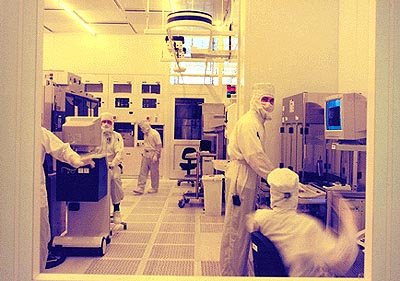In een tweede press release heeft AMD vandaag bekend gemaakt dat het is begonnen met de levering van Athlon processors vanuit hun nieuwe fabriek in Dresden. Dresden maakt gebruik van een geavanceerd 0,18micron koper-interconnect bakprocédé, wat hogere kloksnelheden en kleinere 'dices' mogelijk maakt. Volgens AMD zijn de yields in Dresden tot dusver 'excellent':
AMD announced today that it has commenced commercial shipments of AMD Athlon(TM) processors with performance-enhancing cache memory manufactured with 180-nanometer (0.18-micron) copper interconnect technology from its newest ``megafab,'' Fab 30 in Dresden, Germany.
The first product from Fab 30 is AMD's most advanced PC processor, an AMD Athlon processor featuring 256 kilobytes of integrated on-chip L2 cache and 128 kilobytes of L1 cache. With approximately 37 million transistors and clock speeds initially up to 1 gigahertz, the latest member of the AMD Athlon processor family is targeted at the performance sector of the PC market.
``The Free State of Saxony actively supported the AMD Fab 30 project from the beginning,'' said Saxony Prime Minister Professor Kurt Biedenkopf. ``We are happy to see that the Dresden microprocessor fab has started to ship product after years of planning, construction, and qualification. This is an important day, not only for AMD Saxony, but also for the entire region. Saxony is well on its way to becoming a modern industrial state, where successful companies research, develop, and manufacture products for the world market. On a day like this, we are taking a big step toward this goal,'' said Prime Minister Biedenkopf.
``The opening of Fab 30 is a major milestone on our journey toward our goal of capturing a 30 percent unit share of the semiconductor industry's largest market segment, PC processors,'' said W.J. Sanders III, chairman and chief executive officer of AMD. ``With two megafabs now positioned with the world's leading microprocessor technology, we can further improve our ability to meet customer demand for the world's highest-performance PC processors. Employing state-of-the-art 180-nanometer technology with copper interconnects, Fab 30 will enable AMD to continue to produce the world's highest-performance PC processors in volume. We are extremely pleased with the progress we are making in Fab 30. Yields and speed-grade distributions from our initial production of AMD Athlon processors on 180-nanometer copper technology in Fab 30 already match or exceed the yields and speed-grade distributions we are achieving on 180-nanometer aluminum technology in Fab 25.''
``Fab 30 has been designed to accommodate the most advanced process technologies and incorporates state-of-the-art clean room techniques,'' said Dr. William Siegle, senior vice president of Technology and Manufacturing Operations and chief scientist at AMD. ``The successful start-up and initial shipments from Fab 30 represent our first revenue-generating implementation of technology developed through the AMD-Motorola alliance begun in 1998,'' said Siegle. ``The efforts of our joint development team at Motorola's Austin facility are paying off. The latest member of the AMD Athlon processor family, with transistors featuring 100-nanometer gates and copper interconnect technology, is our first commercial product employing process technology resulting from this joint development effort. In particular, copper interconnect technology will not only provide immediate benefits, but will take on added importance in future processor generations employing finer geometry technologies,'' said Siegle.
``Yields and speed-grade distribution during our early production stages in Fab 30 have been excellent,'' said James Doran, vice president and general manager, AMD Saxony Manufacturing GmbH. ``These excellent results can be attributed to employment of the latest tool sets, the rigor of our copper interconnect technology, and the outstanding efforts of our Dresden work force.''
Construction of Fab 30, located on a 75-acre campus in the community of Wilschdorf on the northern edge of Dresden, was completed in the spring of 1998. Pilot production, using an AMD-K6® processor as a development vehicle, began in January of 1999. The first devices employing copper interconnect technology were produced in July of 1999, leading to the first commercial shipments of PC processors employing copper interconnect technology this month. The site also includes the Dresden Design Center, which is currently developing a new companion chip that incorporates communications features that will complement AMD's next-generation PC processors. When fully equipped, Fab 30 will represent a total investment of $1.9 billion. The AMD Dresden site currently employs approximately 1,150 people, including 70 at the Dresden Design Center. Total employment at the Dresden site is expected to reach 1,800 people by the end of 2001.
 |

